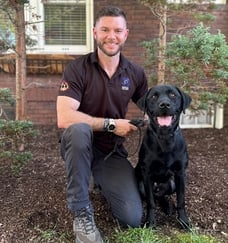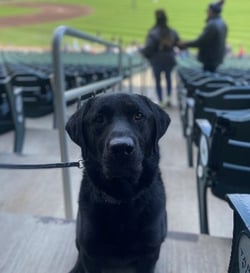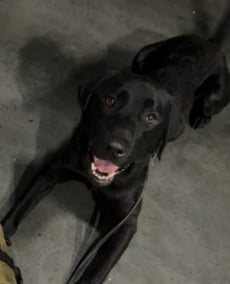MSA Security® Explosive Detection Canine Handler Miles Courtney thinks back to the first day he brought two-year-old black Labrador Rudy home to meet his family. He says that it was his son, Hudson, who gave the thumbs-up on the new addition. “At just three years old, my son took to Rudy right away. They were best buds from the start and that night, fell asleep together in Hudson’s bed,” Miles says with a smile. That first meeting was just four months ago and Miles reports that it was the start of an extremely close partnership.
All MSA explosive and firearms detection canines are paired with a single handler to reinforce a strong and unique working bond that enhances success in the field. Never kenneled, MSA canines live at home with handlers’ families which fosters connectivity and comfort, while allowing for daily training. “Rudy is a food-reward dog, which means he’s not eating meals from a dog bowl. His food comes only when I train him which reinforces his ability to detect explosive odors,” explains Miles.
 On most days, after a power breakfast and quick walk, Miles and Rudy head out to an international cargo carrier facility in Kentucky to screen incoming and outgoing packages. Regulated cargo screening is a high-demand and fast-paced job but these two would not have it any other way. “Rudy is a powerhouse cargo screening K9. He is young and energetic with an incredible nose for odor,” says Miles. Properly trained canines offer an effective and efficient cargo screening alternative to even the most sophisticated technology. Teams have the unique ability to maneuver through a dynamic and fast-moving screening environment, adapting to the cargo sort process so that screening is completed with very little disruption.
On most days, after a power breakfast and quick walk, Miles and Rudy head out to an international cargo carrier facility in Kentucky to screen incoming and outgoing packages. Regulated cargo screening is a high-demand and fast-paced job but these two would not have it any other way. “Rudy is a powerhouse cargo screening K9. He is young and energetic with an incredible nose for odor,” says Miles. Properly trained canines offer an effective and efficient cargo screening alternative to even the most sophisticated technology. Teams have the unique ability to maneuver through a dynamic and fast-moving screening environment, adapting to the cargo sort process so that screening is completed with very little disruption.
While cargo screening is their primary deployment, this duo also takes on assignments throughout the mid-west, including sporting and entertainment events. Miles believes changing environments helps with a dog’s growth and confidence. In air cargo, screening is very detail driven and the handler leads the search in most instances. Within commercial environments, like stadiums and entertainment venues, canines need the confidence to lead and track explosive odor within extremely large crowds. “Rudy is always ready to work and can pivot between different environments. That change in the site picture keeps both of us on our toes,” says Miles.
throughout the mid-west, including sporting and entertainment events. Miles believes changing environments helps with a dog’s growth and confidence. In air cargo, screening is very detail driven and the handler leads the search in most instances. Within commercial environments, like stadiums and entertainment venues, canines need the confidence to lead and track explosive odor within extremely large crowds. “Rudy is always ready to work and can pivot between different environments. That change in the site picture keeps both of us on our toes,” says Miles.
Prior to joining MSA, Miles, who is from Madison, IN, served in law enforcement. His desire for civil service emerged at an early age. He began in a jail setting and then moved onto a  community police force. Awarded Hard Charger of the Year and Lead Officer, Miles earned the attention of his superiors, as well as a larger department in Lafayette, IN. He was recruited to the Lafayette force and served for five years before accepting a position with MSA. “I loved serving my community alongside fellow officers who were incredibly dedicated. I am also so grateful to have found my way to MSA, like-minded colleagues, and Rudy! I have not looked back for a minute,” he says.
community police force. Awarded Hard Charger of the Year and Lead Officer, Miles earned the attention of his superiors, as well as a larger department in Lafayette, IN. He was recruited to the Lafayette force and served for five years before accepting a position with MSA. “I loved serving my community alongside fellow officers who were incredibly dedicated. I am also so grateful to have found my way to MSA, like-minded colleagues, and Rudy! I have not looked back for a minute,” he says.
Learn more about how MSA leads in canine cargo screening solutions.
To meet more of MSA’s Explosive and Firearms Detection Canine Teams, and for timely content from MSA’s subject matter experts, be sure to subscribe to our blog.
